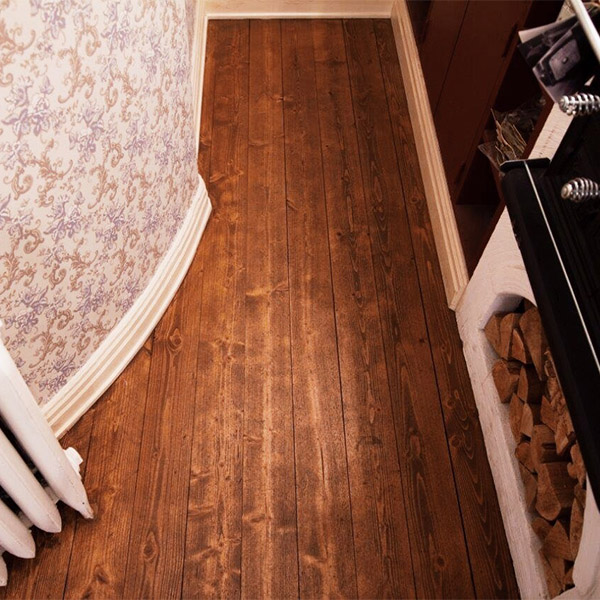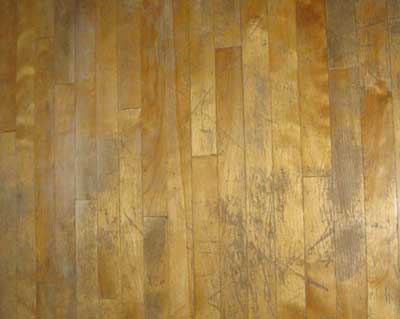The warm glow of natural wood floors adds a touch of elegance to any home. But keeping them looking their best can be a challenge, especially when it comes to finding safe and effective cleaning and maintenance solutions. For years, homeowners have turned to linseed oil, a natural product derived from flax seeds, as a potential answer. But can you really use linseed oil on hardwood floors? The answer, it turns out, is a bit more complicated than a simple yes or no.

Image: mromavolley.com
As a homeowner myself, I’ve always been drawn to natural solutions for cleaning and caring for my home. When I first moved into my house with its beautiful hardwood floors, I was eager to find a natural way to keep them looking their best. Linseed oil seemed like the perfect solution – a natural product that promised to nourish and protect the wood. But after doing some research, I realized that while linseed oil can be used on wooden furniture, it’s not necessarily the best choice for hardwood floors.
Linseed Oil and Hardwood Floors: Understanding the Pros and Cons
What is Linseed Oil?
Linseed oil, also known as flaxseed oil, is a drying oil extracted from the seeds of the flax plant. It has been used for centuries in various applications, from painting and varnishing to woodworking and even as a dietary supplement. The key to understanding linseed oil’s potential as a floor treatment lies in its unique properties.
When applied to wood, linseed oil penetrates the surface, filling in pores and creating a protective layer. This layer helps to resist water damage, stains, and scratches, enhancing the wood’s natural beauty and durability. However, there are some important factors to consider before applying linseed oil on your hardwood floors.
The Pros of Linseed Oil for Floors
While it’s important to approach linseed oil with caution, it does offer some advantages for hardwood floor care:
- Natural and Non-Toxic: Linseed oil is a natural product that doesn’t contain harsh chemicals or synthetic ingredients. This makes it a safer option for people with allergies or sensitivities. For those concerned about the environmental impact of their cleaning products, linseed oil presents a sustainable alternative.
- Adds a Satin Sheen: Linseed oil can enhance the natural beauty of wood by adding a subtle, satin sheen. This can make your floors look richer and more vibrant.
- Provides Moisture Protection: The oil’s penetrating properties create a water-resistant barrier, helping to protect your floors from spills and moisture damage.

Image: mromavolley.com
The Cons of Linseed Oil for Floors
Linseed oil can be a bit of a double-edged sword for hardwood floors. While it provides some benefits, it also has its drawbacks:
- Slow Drying Time: Linseed oil takes a long time to dry – anywhere from 24 to 72 hours, depending on the temperature and humidity. This means you need to be extra careful to prevent foot traffic or spills while the oil is drying.
- Potential for Slippery Floors: A freshly applied coat of linseed oil can leave your floor quite slippery. This can be a safety hazard, especially for young children and elderly individuals.
- Susceptibility to Discoloration: Linseed oil can darken the wood, which can be a concern for homeowners with light-colored floors.
- Risk of Yellowing or Oxidation: Over time, linseed oil can oxidize and turn yellow, particularly when exposed to sunlight. This can create an uneven appearance on your floor.
Alternative Solutions for Hardwood Floor Care
Given the potential challenges associated with linseed oil, it’s wise to consider alternative solutions for maintaining your hardwood floors. The market offers a wide range of products specifically designed for hardwood floors, including:
- Hardwood Floor Cleaners: These cleaners effectively remove dirt and grime without damaging the finish.
- Floor Polishes: Polishes add a shine to your floors, helping to protect them from scratches and wear.
- Floor Sealants: Sealants create a protective barrier that prevents water damage and stains.
It’s crucial to choose products that are specifically formulated for hardwood floors and to follow the manufacturer’s instructions carefully. Using the right products and techniques can significantly extend the life of your floors.
Expert Tips for Hardwood Floor Maintenance
Here are some expert tips for keeping your hardwood floors looking their best:
- Sweep or Vacuum Regularly: Removing dust and debris regularly prevents scratches and build-up.
- Clean Spills Immediately: Act quickly to prevent stains and water damage.
- Use a Damp Mop for Cleaning: Avoid using excessive water, which can warp the wood.
- Place Mats and Runners: These help to protect your floors from high-traffic areas.
- Consider Professional Refinishing: As your floors age, they may need professional refinishing to restore their shine and protect them from further wear.
By applying these tips and choosing appropriate floor care products, you can keep your hardwood floors looking beautiful for years to come.
FAQs about Linseed Oil and Hardwood Floors
Q: Can I use linseed oil to refinish my hardwood floors?
A: While linseed oil can be used to finish wood furniture, it is not recommended for refinishing hardwood floors. Professional floor refinishing involves sanding and sealing, which cannot be achieved using linseed oil alone.
Q: How do I apply linseed oil to my hardwood floors?
A: If you do decide to use linseed oil, apply it sparingly using a clean cloth or brush. Be sure to avoid over-application, as this can create a sticky or gummy surface. Allow the oil to dry completely before walking on the floor.
Q: Is linseed oil safe for pets and children?
A: While linseed oil is generally considered safe for pets and children once it has dried completely, it is crucial to keep them away from the area while the oil is wet. It is essential to ensure the oil is completely dry and non-toxic before allowing pets or children to play on the floor.
Can You Use Linseed Oil On Hardwood Floors
Conclusion
So, can you use linseed oil on hardwood floors? The answer, in most cases, is no. While linseed oil offers some natural benefits, its drawbacks for floor care often outweigh its advantages. Consider exploring alternative solutions like hardwood floor cleaners, polishes, and sealants for a safe and effective way to protect your investment. Remember, the key to maintaining beautiful hardwood floors is regular maintenance, the right products, and a little bit of care.
Are you interested in reading more about natural cleaning solutions or alternative floor care products? Let us know in the comments below!



/GettyImages-173599369-58ad68f83df78c345b829dfc.jpg?w=740&resize=740,414&ssl=1)


